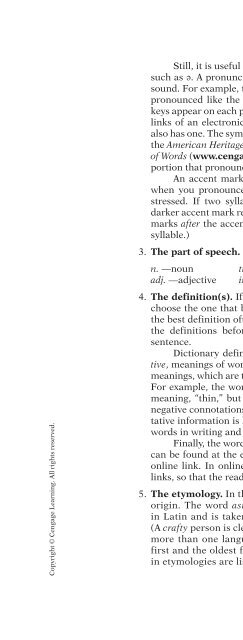- Page 4: The World of Words
- Page 10: Dedicated to the memories of my fat
- Page 14: CONTENTSPrefacexiiiPART1 Dictionary
- Page 18: ContentsixWord Roots Part 1 173Word
- Page 22: ContentsxiChapter Exercises 385Pass
- Page 26: PREFACECopyright © Cengage Learnin
- Page 30: Prefacexv• Added features in voca
- Page 34: PART1Dictionary Skillsand Context C
- Page 38: Parts of Speech 3The rumor spread m
- Page 42: Word Endings and Parts of Speech 5I
- Page 46: CHAPTER1Words About PeopleAre you s
- Page 50: Learning Strategy 9A host of fascin
- Page 56: 12 Chapter 1 Words About PeopleMidd
- Page 60: 14 Chapter 1 Words About PeopleMain
- Page 64: 16 Chapter 1 Words About Peopleb. h
- Page 68: 18 Chapter 1 Words About PeopleLuci
- Page 72: 20 Chapter 1 Words About People5. T
- Page 76: 22 Chapter 1 Words About PeopleWord
- Page 80: 24 Chapter 1 Words About People Rel
- Page 84: 26 Chapter 1 Words About People22.
- Page 88: 28 Chapter 1 Words About People4. S
- Page 92: 30 Chapter 1 Words About People5. W
- Page 96: 32 Chapter 1 Words About People3. H
- Page 100: 34 Chapter 1 Words About PeoplePass
- Page 104:
36 Chapter 1 Words About Peoplewher
- Page 108:
CHAPTER2Words in the NewsNews trave
- Page 112:
40 Chapter 2 Words in the NewsAt ot
- Page 116:
42 Chapter 2 Words in the NewsSubst
- Page 120:
44 Chapter 2 Words in the News Rela
- Page 124:
46 Chapter 2 Words in the News Rela
- Page 128:
48 Chapter 2 Words in the News■ W
- Page 132:
50 Chapter 2 Words in the Newsapart
- Page 136:
52 Chapter 2 Words in the News Rela
- Page 140:
54 Chapter 2 Words in the Newsc. pl
- Page 144:
56 Chapter 2 Words in the News4. Th
- Page 148:
58 Chapter 2 Words in the News3. de
- Page 152:
60 Chapter 2 Words in the News5. Th
- Page 156:
62 Chapter 2 Words in the News2. Af
- Page 160:
64 Chapter 2 Words in the NewsFor y
- Page 164:
66 Chapter 2 Words in the News9. So
- Page 168:
CHAPTER3Words for Feeling,Expressio
- Page 172:
70 Chapter 3 Words for Feeling, Exp
- Page 176:
72 Chapter 3 Words for Feeling, Exp
- Page 180:
74 Chapter 3 Words for Feeling, Exp
- Page 184:
76 Chapter 3 Words for Feeling, Exp
- Page 188:
78 Chapter 3 Words for Feeling, Exp
- Page 192:
80 Chapter 3 Words for Feeling, Exp
- Page 196:
82 Chapter 3 Words for Feeling, Exp
- Page 200:
84 Chapter 3 Words for Feeling, Exp
- Page 204:
86 Chapter 3 Words for Feeling, Exp
- Page 208:
88 Chapter 3 Words for Feeling, Exp
- Page 212:
90 Chapter 3 Words for Feeling, Exp
- Page 216:
92 Chapter 3 Words for Feeling, Exp
- Page 220:
94 Chapter 3 Words for Feeling, Exp
- Page 224:
96 Chapter 3 Words for Feeling, Exp
- Page 228:
98 Chapter 4 Other Useful English W
- Page 232:
100 Chapter 4 Other Useful English
- Page 236:
102 Chapter 4 Other Useful English
- Page 240:
104 Chapter 4 Other Useful English
- Page 244:
106 Chapter 4 Other Useful English
- Page 248:
108 Chapter 4 Other Useful English
- Page 252:
110 Chapter 4 Other Useful English
- Page 256:
112 Chapter 4 Other Useful English
- Page 260:
114 Chapter 4 Other Useful English
- Page 264:
116 Chapter 4 Other Useful English
- Page 268:
118 Chapter 4 Other Useful English
- Page 272:
120 Chapter 4 Other Useful English
- Page 276:
122 Chapter 4 Other Useful English
- Page 280:
124 Chapter 4 Other Useful English
- Page 284:
126 Chapter 4 Other Useful English
- Page 288:
128 Chapter 4 Other Useful English
- Page 292:
130 Chapter 4 Other Useful English
- Page 296:
132 Part 2 Word ElementsRootsA root
- Page 300:
134 Part 2 Word ElementsThe answer
- Page 304:
136 Chapter 5 Word Elements: Prefix
- Page 308:
138 Chapter 5 Word Elements: Prefix
- Page 312:
140 Chapter 5 Word Elements: Prefix
- Page 316:
142 Chapter 5 Word Elements: Prefix
- Page 320:
144 Chapter 5 Word Elements: Prefix
- Page 324:
146 Chapter 5 Word Elements: Prefix
- Page 328:
148 Chapter 5 Word Elements: Prefix
- Page 332:
150 Chapter 5 Word Elements: Prefix
- Page 336:
152 Chapter 5 Word Elements: Prefix
- Page 340:
154 Chapter 5 Word Elements: Prefix
- Page 344:
156 Chapter 5 Word Elements: Prefix
- Page 348:
158 Chapter 5 Word Elements: Prefix
- Page 352:
160 Chapter 5 Word Elements: Prefix
- Page 356:
162 Chapter 5 Word Elements: Prefix
- Page 360:
164 Chapter 5 Word Elements: Prefix
- Page 364:
166 Chapter 5 Word Elements: Prefix
- Page 368:
168 Chapter 5 Word Elements: Prefix
- Page 372:
CHAPTER6Word Elements:People and Na
- Page 376:
172 Chapter 6 Word Elements: People
- Page 380:
174 Chapter 6 Word Elements: People
- Page 384:
176 Chapter 6 Word Elements: People
- Page 388:
178 Chapter 6 Word Elements: People
- Page 392:
180 Chapter 6 Word Elements: People
- Page 396:
182 Chapter 6 Word Elements: People
- Page 400:
184 Chapter 6 Word Elements: People
- Page 404:
186 Chapter 6 Word Elements: People
- Page 408:
188 Chapter 6 Word Elements: People
- Page 412:
190 Chapter 6 Word Elements: People
- Page 416:
192 Chapter 6 Word Elements: People
- Page 420:
194 Chapter 6 Word Elements: People
- Page 424:
196 Chapter 6 Word Elements: People
- Page 428:
198 Chapter 6 Word Elements: People
- Page 432:
200 Chapter 6 Word Elements: People
- Page 436:
202 Chapter 6 Word Elements: People
- Page 440:
CHAPTER7Word Elements: MovementMode
- Page 444:
206 Chapter 7 Word Elements: Moveme
- Page 448:
208 Chapter 7 Word Elements: Moveme
- Page 452:
210 Chapter 7 Word Elements: Moveme
- Page 456:
212 Chapter 7 Word Elements: Moveme
- Page 460:
214 Chapter 7 Word Elements: Moveme
- Page 464:
216 Chapter 7 Word Elements: Moveme
- Page 468:
218 Chapter 7 Word Elements: Moveme
- Page 472:
220 Chapter 7 Word Elements: Moveme
- Page 476:
222 Chapter 7 Word Elements: Moveme
- Page 480:
224 Chapter 7 Word Elements: Moveme
- Page 484:
226 Chapter 7 Word Elements: Moveme
- Page 488:
228 Chapter 7 Word Elements: Moveme
- Page 492:
230 Chapter 7 Word Elements: Moveme
- Page 496:
232 Chapter 7 Word Elements: Moveme
- Page 500:
234 Chapter 7 Word Elements: Moveme
- Page 504:
CHAPTER8Word Elements:Together and
- Page 508:
238 Chapter 8 Word Elements: Togeth
- Page 512:
240 Chapter 8 Word Elements: Togeth
- Page 516:
242 Chapter 8 Word Elements: Togeth
- Page 520:
244 Chapter 8 Word Elements: Togeth
- Page 524:
246 Chapter 8 Word Elements: Togeth
- Page 528:
248 Chapter 8 Word Elements: Togeth
- Page 532:
250 Chapter 8 Word Elements: Togeth
- Page 536:
252 Chapter 8 Word Elements: Togeth
- Page 540:
254 Chapter 8 Word Elements: Togeth
- Page 544:
256 Chapter 8 Word Elements: Togeth
- Page 548:
258 Chapter 8 Word Elements: Togeth
- Page 552:
260 Chapter 8 Word Elements: Togeth
- Page 556:
262 Chapter 8 Word Elements: Togeth
- Page 560:
264 Chapter 8 Word Elements: Togeth
- Page 564:
266 Chapter 8 Word Elements: Togeth
- Page 568:
268 Chapter 8 Word Elements: Togeth
- Page 572:
270 Chapter 8 Word Elements: Togeth
- Page 576:
272 Chapter 9 Word Elements: Number
- Page 580:
274 Chapter 9 Word Elements: Number
- Page 584:
276 Chapter 9 Word Elements: Number
- Page 588:
278 Chapter 9 Word Elements: Number
- Page 592:
280 Chapter 9 Word Elements: Number
- Page 596:
282 Chapter 9 Word Elements: Number
- Page 600:
284 Chapter 9 Word Elements: Number
- Page 604:
286 Chapter 9 Word Elements: Number
- Page 608:
288 Chapter 9 Word Elements:Numbers
- Page 612:
290 Chapter 9 Word Elements:Numbers
- Page 616:
292 Chapter 9 Word Elements: Number
- Page 620:
294 Chapter 9 Word Elements: Number
- Page 624:
296 Chapter 9 Word Elements: Number
- Page 628:
298 Chapter 9 Word Elements: Number
- Page 632:
300 Chapter 9 Word Elements: Number
- Page 636:
302 Chapter 9 Word Elements: Number
- Page 640:
CHAPTER10Word Elements:Thought and
- Page 644:
306 Chapter 10 Word Elements: Thoug
- Page 648:
308 Chapter 10 Word Elements: Thoug
- Page 652:
310 Chapter 10 Word Elements: Thoug
- Page 656:
312 Chapter 10 Word Elements: Thoug
- Page 660:
314 Chapter 10 Word Elements: Thoug
- Page 664:
316 Chapter 10 Word Elements: Thoug
- Page 668:
318 Chapter 10 Word Elements: Thoug
- Page 672:
320 Chapter 10 Word Elements: Thoug
- Page 676:
322 Chapter 10 Word Elements: Thoug
- Page 680:
324 Chapter 10 Word Elements: Thoug
- Page 684:
326 Chapter 10 Word Elements: Thoug
- Page 688:
328 Chapter 10 Word Elements: Thoug
- Page 692:
330 Chapter 10 Word Elements: Thoug
- Page 696:
332 Chapter 10 Word Elements: Thoug
- Page 700:
334 Chapter 11 Word Elements: The B
- Page 704:
336 Chapter 11 Word Elements: The B
- Page 708:
338 Chapter 11 Word Elements: The B
- Page 712:
340 Chapter 11 Word Elements: The B
- Page 716:
342 Chapter 11 Word Elements: The B
- Page 720:
344 Chapter 11 Word Elements: The B
- Page 724:
346 Chapter 11 Word Elements: The B
- Page 728:
348 Chapter 11 Word Elements: The B
- Page 732:
350 Chapter 11 Word Elements: The B
- Page 736:
352 Chapter 11 Word Elements: The B
- Page 740:
354 Chapter 11 Word Elements: The B
- Page 744:
356 Chapter 11 Word Elements: The B
- Page 748:
358 Chapter 11 Word Elements: The B
- Page 752:
360 Chapter 11 Word Elements: The B
- Page 756:
362 Chapter 11 Word Elements: The B
- Page 760:
CHAPTER12Word Elements:Speech and W
- Page 764:
366 Chapter 12 Word Elements: Speec
- Page 768:
368 Chapter 12 Word Elements: Speec
- Page 772:
370 Chapter 12 Word Elements: Speec
- Page 776:
372 Chapter 12 Word Elements: Speec
- Page 780:
374 Chapter 12 Word Elements: Speec
- Page 784:
376 Chapter 12 Word Elements: Speec
- Page 788:
378 Chapter 12 Word Elements: Speec
- Page 792:
380 Chapter 12 Word Elements: Speec
- Page 796:
382 Chapter 12 Word Elements: Speec
- Page 800:
384 Chapter 12 Word Elements: Speec
- Page 804:
386 Chapter 12 Word Elements: Speec
- Page 808:
388 Chapter 12 Word Elements: Speec
- Page 812:
390 Chapter 12 Word Elements: Speec
- Page 816:
392 Chapter 12 Word Elements: Speec
- Page 820:
394 Chapter 12 Word Elements: Speec
- Page 824:
396 Chapter 12 Word Elements: Speec
- Page 828:
398 Chapter 12 Word Elements: Speec
- Page 832:
400 Answers to QuizzesCHAPTER 9page
- Page 836:
This page intentionally left blank
- Page 840:
404 Indexbureaucrat, 44bureaucratic
- Page 844:
406 Indexhenpecked, 305high time, 1
- Page 848:
408 Indexvital, 179vitality, 180viv



